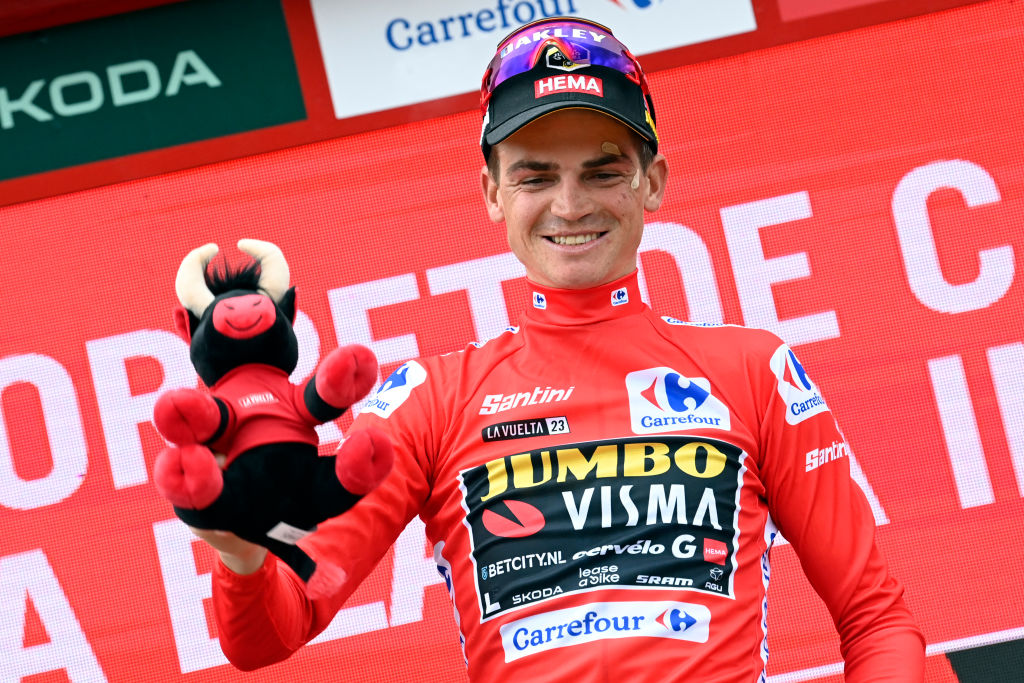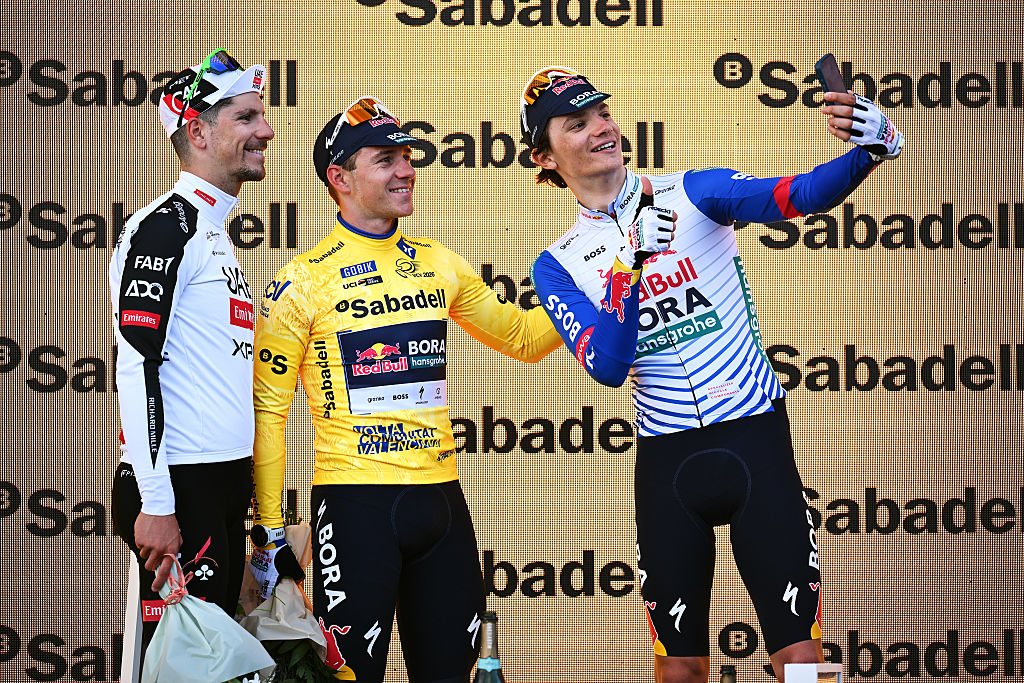Sepp Kuss takes historic first lead in Grand Tour at Vuelta a España
Jumbo-Visma rider first American to hold la roja since 2013 overall winner Chris Horner

The latest race content, interviews, features, reviews and expert buying guides, direct to your inbox!
You are now subscribed
Your newsletter sign-up was successful
Sepp Kuss’ seventh place in stage 8 of the 2023 Vuelta a España has seen the Jumbo-Visma climbing champion take both his first-ever lead in a Grand Tour and the first roja for the USA in the Spanish race since Chris Horner won it outright back in 2013.
Riding his twelfth Grand Tour, Kuss was lying second overall, eight seconds behind Frenchman Lenny Martínez (Groupama-FDJ) after his summit finish victory at Javalambre on Thursday.
48 hours later on the Xorret de Catí, as Martínez faded badly, Kuss tried to distance the remainder of the group of favourites further up the slope.
His attack was reeled in by defending Vuelta champion Remco Evenepoel, but Kuss still managed to stay with the other favourites as they crowned the ultra-difficult climb and crossed the line in seventh place behind teammate Primož Roglič.
Any earlier insistence that he was not a GC candidate alongside Roglič and Jonas Vingegaard has now been quietly shelved, with the American saying after the stage “I would like to keep the jersey to the last day,” and Roglič describing Kuss as an overall contender as well.
However, as Kuss said, what also mattered to him was finally being able to lead a Grand Tour. “That’s something I would never have expected,” he said, “but that’s the beauty of the Vuelta.”
“You see lots of different kinds of riders wear the leader's jersey, it’s not like the Tour when only the really strongest guy ever gets it. So it’s really cool to be in this position, and I just have to enjoy it because it’s not every day that can happen.”
The latest race content, interviews, features, reviews and expert buying guides, direct to your inbox!
His strategy on the Xorret de Catí was to try to draw out the other riders, and it appeared to work well as Evenepoel, rather than attacking, dug deep to reel him in.
“The idea was to attack first, to force Remco to do his job, but in any case, you can’t go follow other riders’ wheels on such a hard climb and I didn’t have the legs to maintain the difference, especially with Remco driving so hard”
“But before the stage and during it, Primož said he wanted to go for it, and it was a perfect finish for him.”
Climbing talents are one thing, but Kuss’ ability to down a large quantity of Spanish champagne, known locally as cava, in a single gulp became impressively evident on the winner’s stage 6 at Javalambre. Almost inevitably, he was asked by one Spanish journalist whether he’d had a similarly all-out celebration after taking the Vuelta lead.
“There was maybe half a bottle left afterwards;” Kuss said about the stage 6 celebration with a grin as he replied in fluent Spanish. “But with the bubbles in la cava,” he joked, “I was very drunk after the stage. It was a good way to celebrate it, though, you can’t win every race.”
Asked how long he thought he could keep the jersey, Kuss answered directly, “that’s a good question, I’d like to keep the jersey to the last day.”
“But I don’t know whether, with my characteristics in the time trial, I’ll be able to hold my advantage.”
Currently, 43 seconds ahead of Marc Soler (UAE Team Emirates), Kuss currently has a 2:35 gap on the first of the pre-race GC contenders, Evenepoel (Soudal-Quick Step). Given that Evenepoel is currently World Time Trial Champion and also won last year’s Vuelta time trial stage at Alicante, by which point Kuss had already abandoned sick, the American’s caution is only logical.
But at the same time, Jumbo-Visma put on a blistering display of climbing power at Xorret de Catí, and as Kuss argued, the key thing is that a Jumbo rider ends the Vuelta first overall in Madrid.
“Whether it’s Primož, Jonas or me, it doesn’t matter. We all know the strongest guy will go for the win and the others will help him.” By the last week, Kuss said, things should become clearer in that area.
It’s worth remembering that for Kuss the Vuelta represents multiple simultaneous voyages in the dark: he’s not only leading a Grand Tour for the first time in his career but he’s also racing three Grand Tours in the same year for the first time. Kuss did appear to fade slightly towards the top of the Xorret de Catí, and although the climb’s steepness is perhaps not so suited to his talents as a longer grind of a Pyrenean ascent, say, it was a reminder that every day of the Vuelta he is venturing into unknown territory.
That said, Kuss has been performing brilliantly to date, and if any further proof were needed, it’s right there in the colour of the jersey he’ll be wearing on Sunday morning’s start line of the Vuelta.
What’s also true is Kuss has achieved a huge amount since he crossed the Atlantic back as a young Rally Cycling racer in 2017, and given the landmark moment of his career the Vuelta lead represents, the press conference offered him a chance to look back and say if what he’d done to date was what he thought he might have been able to achieve.
“It’s difficult to say,” he replied, “At that point, I was just happy to be racing my bike in Europe, it was a totally new adventure, just racing in Europe was something never I would have expected, and even after first year had some successes, I never knew how far I would go.
“But after those earlier successes, I’ve always stuck to what I like about cycling and even now I keep surprising myself and coming into situations never expected. I’d like to keep it that way - not put any expectations on myself.”
Alasdair Fotheringham has been reporting on cycling since 1991. He has covered every Tour de France since 1992 bar one, as well as numerous other bike races of all shapes and sizes, ranging from the Olympic Games in 2008 to the now sadly defunct Subida a Urkiola hill climb in Spain. As well as working for Cyclingnews, he has also written for The Independent, The Guardian, ProCycling, The Express and Reuters.

